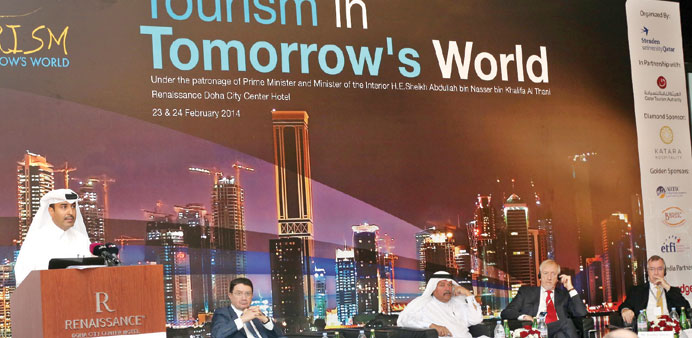By Noimot Olayiwola
Staff Reporter
|
|
By 2030, up to $45bn will be spent to boost tourism in Qatar in anticipation of more than 7mn international travellers visiting the country every year, Qatar Tourism Authority (QTA) chairman Issa bin Mohamed al-Mohannadi disclosed yesterday.
Currently, tourism accounts for 1% of Qatar’s Gross Domestic Product (GDP), which is one of the highest in the world, while its contribution to global GDP has reached 9.3%. Tourism is expected to grow four fold, boosting Qatar’s GDP by up to 3% by 2030.
For the first time in 2012, the number of tourists that travel across international borders reached 1bn with Qatar receiving up to 1.2mn.
Al-Mohannadi was delivering a keynote address during a conference titled “Tourism in Tomorrow’s World”, organised by Stenden University Qatar in partnership with QTA.
The two-day conference is held under the patronage of HE the Prime Minster and Interior Minster Sheikh Abdulla bin Nasser bin Khalifa al-Thani.
“Qatar wants to play a role in the international tourism scene so there is a need to open our hearts and minds to welcome tourists. We must invite people to our country so we can learn from them and they can learn from us,” al-Mohannadi said.
The QTA chairman asserted that focusing on tourism would enable Qatar to improve its infrastructure and visitor facilities and services.
“Qatar can offer an authentic tourist experience as a unique global destination which prides itself on its cultural heritage,” he said.
He described the target of welcoming more than 7mn tourists a year as “the cornerstone” of the QTA’s National Tourism Strategy, which was launched yesterday, pointing out that the figure was a seven-fold
increase from the current number.
He stressed Qatar’s commitment to developing tourism and hospitality in a sustainable way.
“Tourism is the first step towards reducing our dependence on oil and gas and as the world is rapidly changing into a global village, we must be well-prepared to develop a post-carbon economy. Business, entertainment and tourism are the untapped resources to that effect.”
Addressing the conference, United Nations World Tourism Organisation secretary-general Dr Taleb Rifai outlined the significant trends in global tourism and the increasingly important role Qatar would play in regional and international tourism.
He highlighted the rise in the number of global travellers, who exceeded 1bn for the first time in 2012, a growth of 5% on the previous year, predicting it to touch 1.8bn in 2030.
The Middle East, he said, had seen significant growth of tourism – from 24mn travellers in 2000 to 150mn expected by 2030. “Qatar alone has tripled its number of international travellers in the last decade.”
According to Dr Rifai, tourism is no longer the preserve of the wealthy but the right of everybody.
“Travel is not just a need. It is a human right,” he said, affirming the importance of “social, economic and environmental sustainability”. He said: “We have to meet the needs of tourists while protecting our capital – our national and cultural heritage, for generations to come.”
The official welcomed QTA’s National Tourism Strategy. “Qatar is a good example of how you take tourism and make it the national priority. Without a national policy, tourism cannot progress. Tourism is the oil that never runs out.”
Other speakers at the event were Al Faisal Holding and Aamal chairman Sheikh Faisal bin Qassim al-Thani and Stenden University Qatar’s executive dean Prof Robert Coelen.
Prof Coelen stressed the need for more academic research to understand the current tourism environment and to help Qatar – and the region – plan for the future.
“We need to establish a local base of academic talent to focus on research that can steer tourist developments. Qatar must move from being a knowledge consumer to become a cutting-edge knowledge producer in economically important sectors,” he said.
Around 250 delegates from GCC countries, Iraq and the Arab League were present at the opening of the conference, compered by two students from Stenden University Qatar, Najla al-Thani and Mohamed Saruf.

